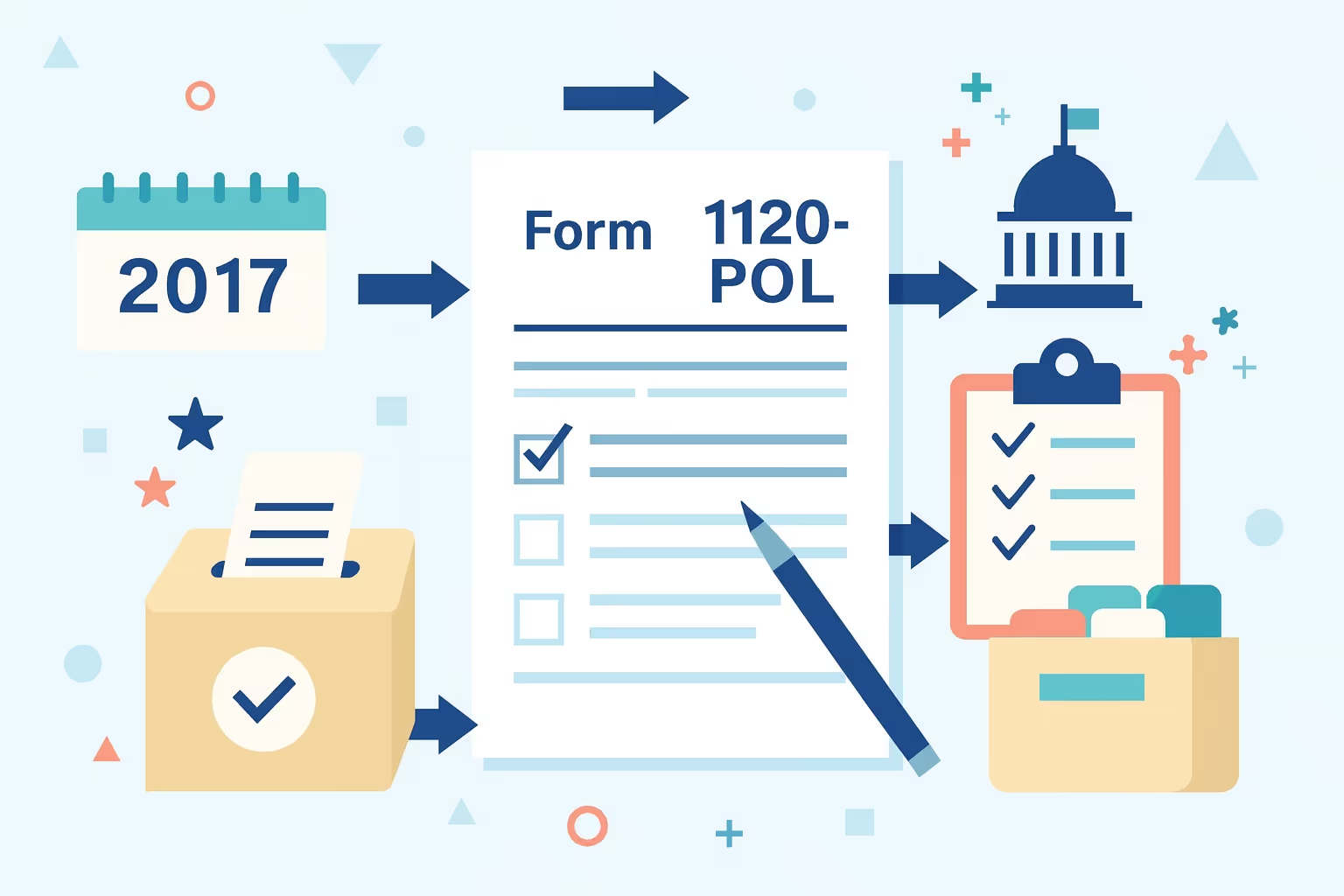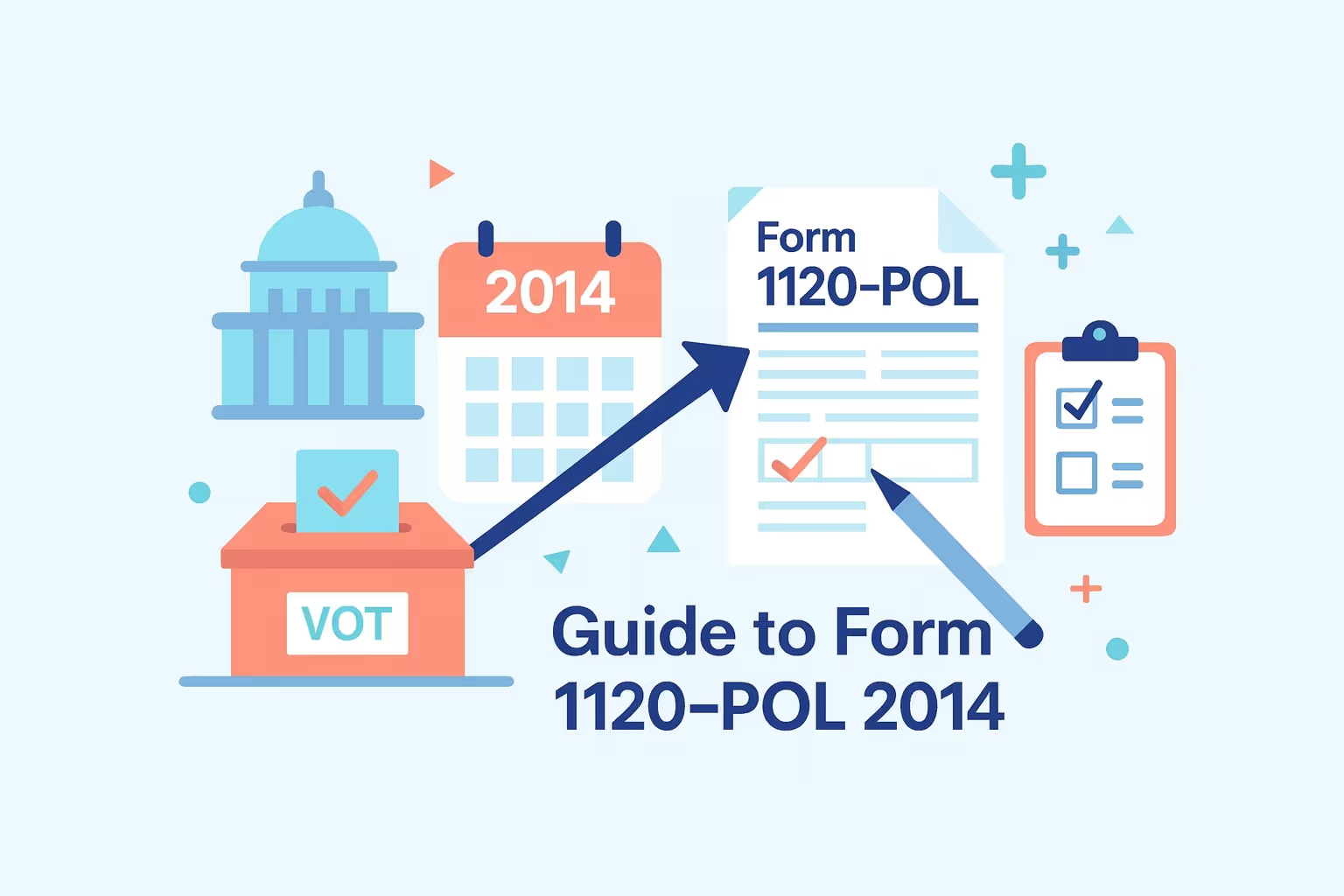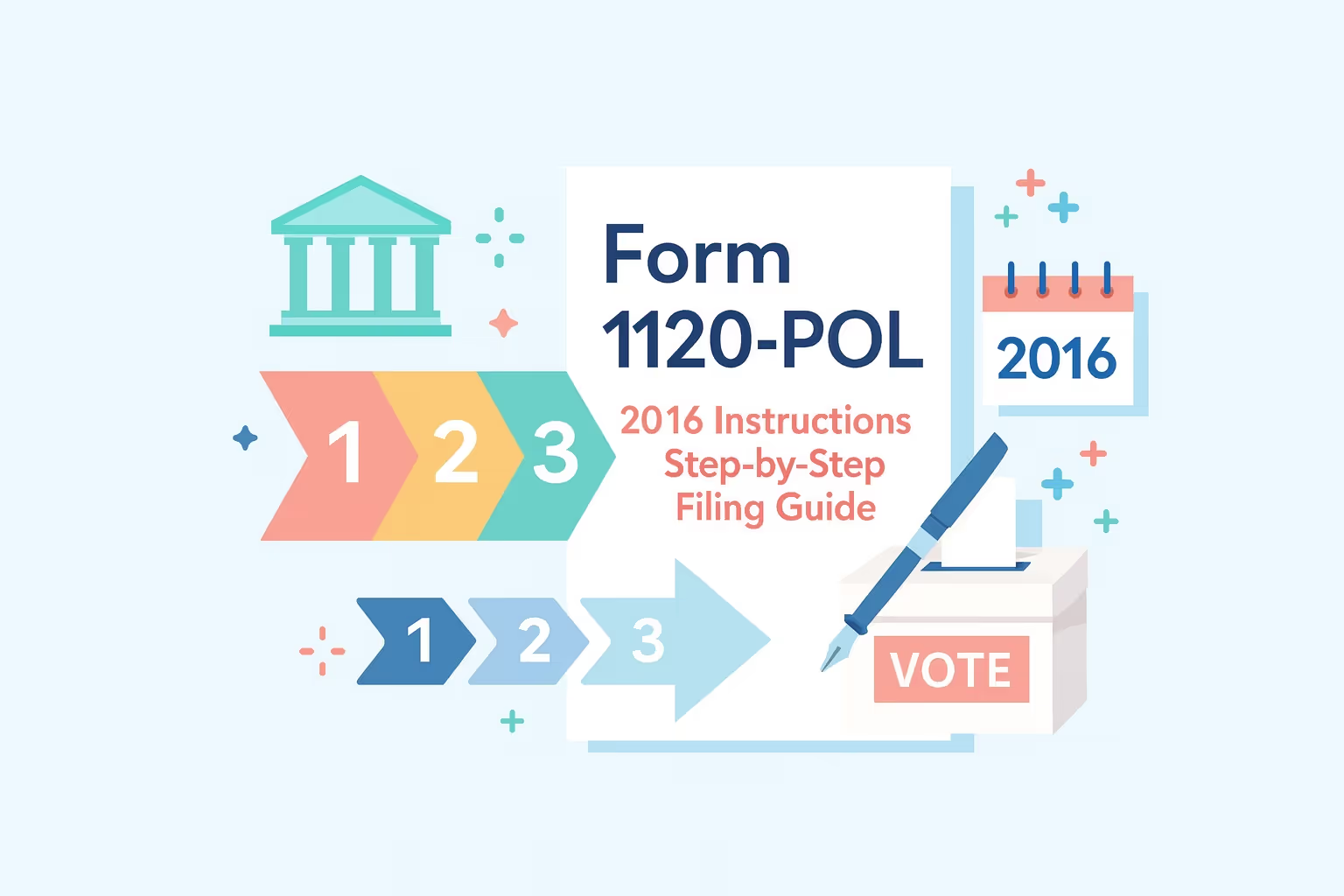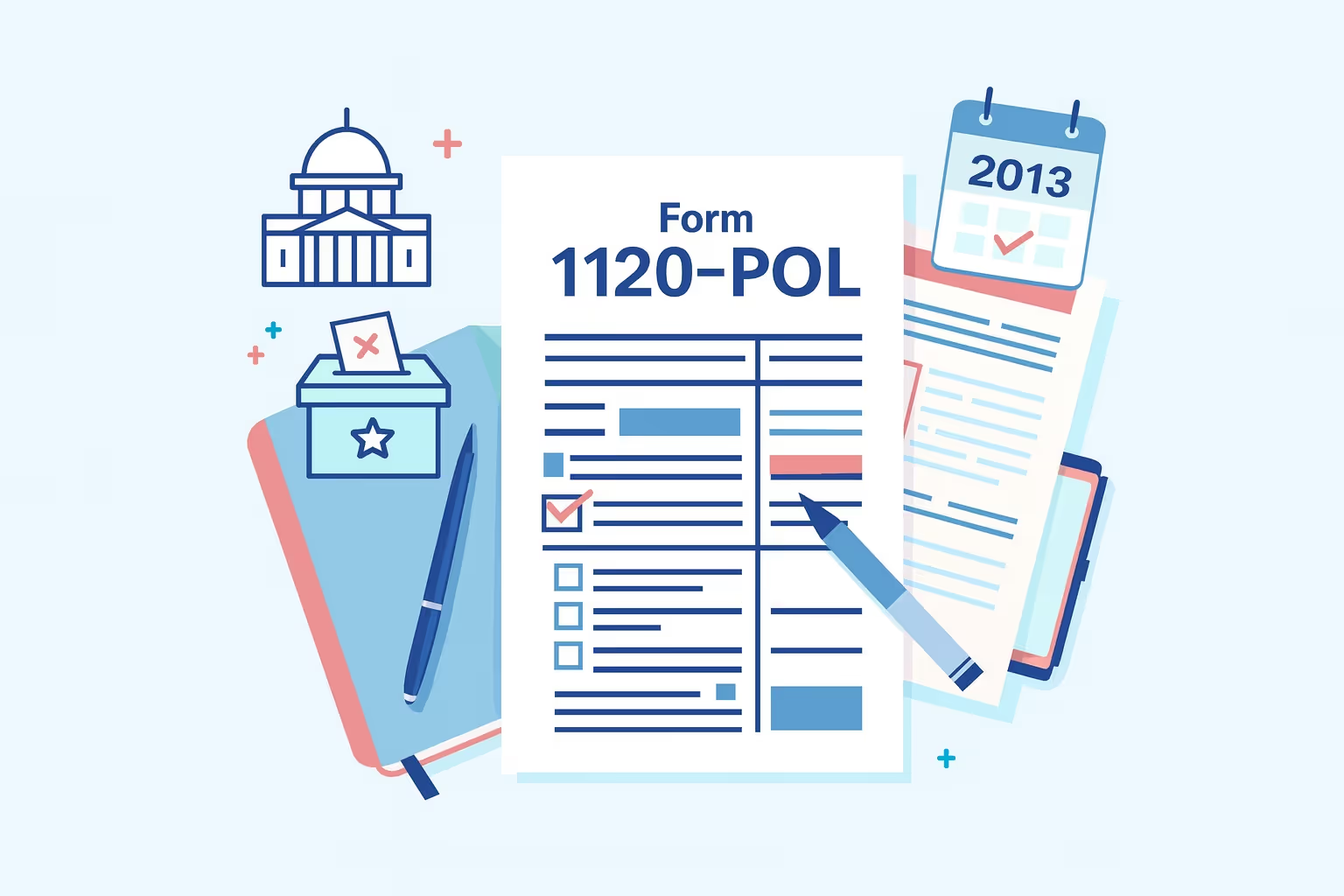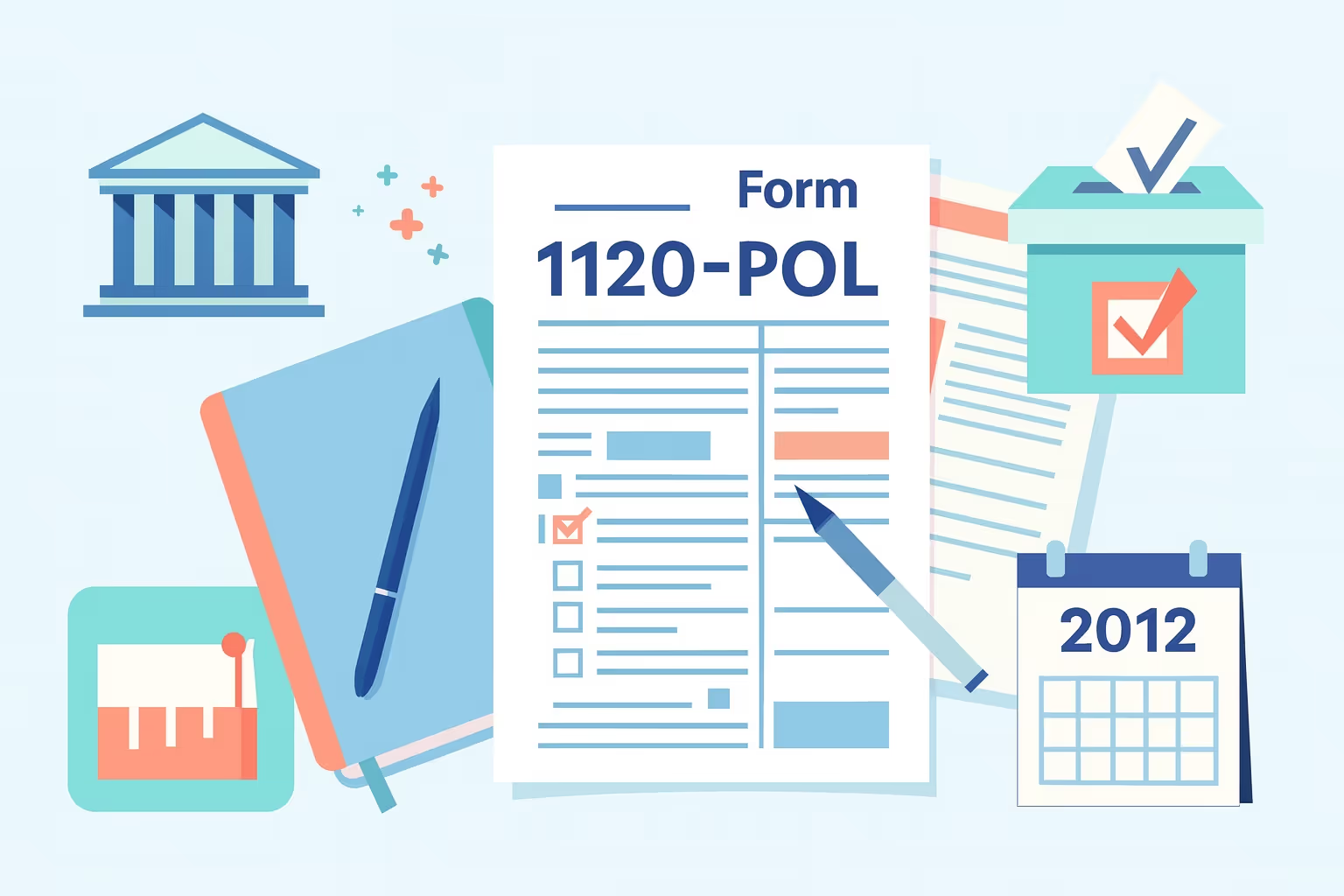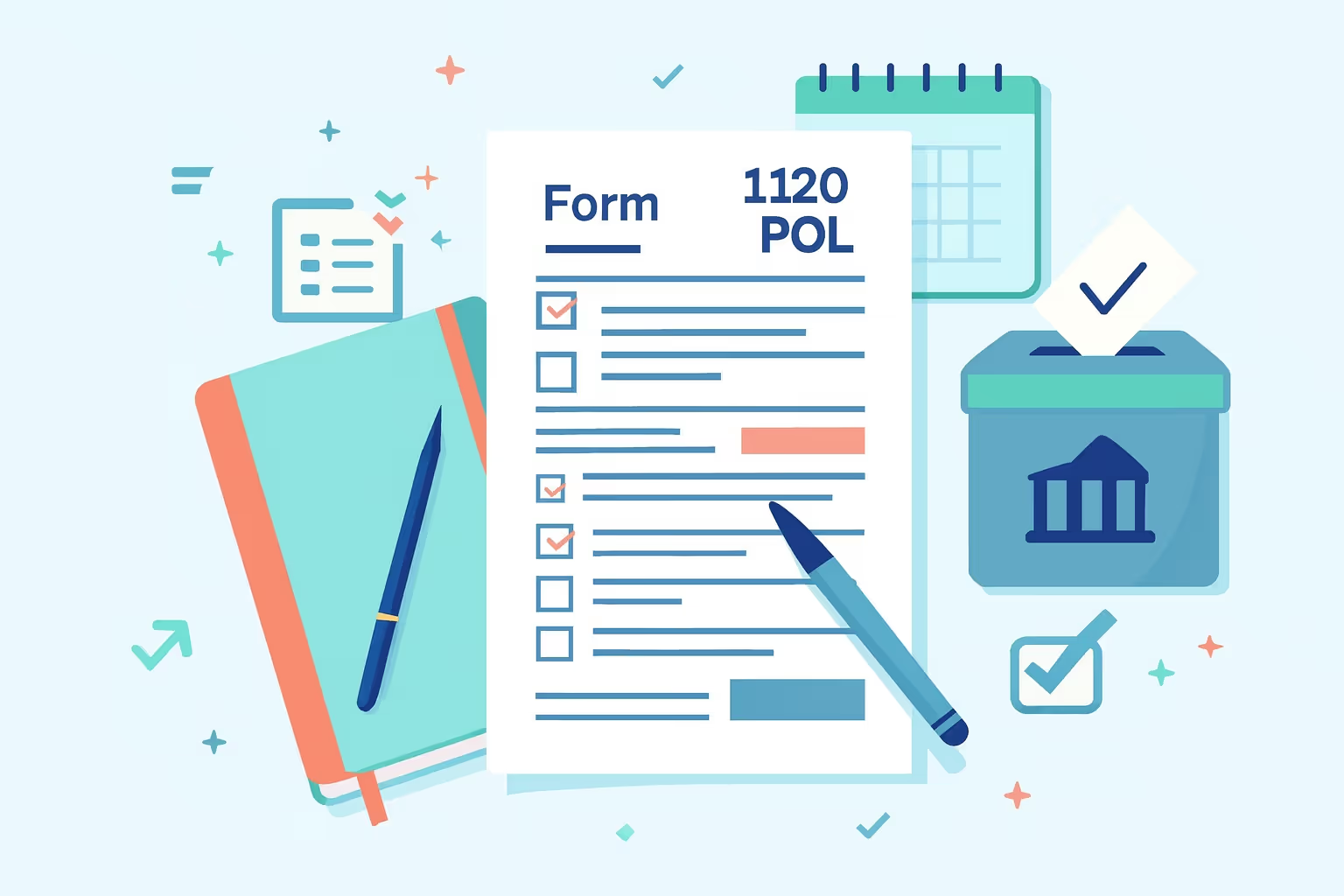
Political organizations have unique tax responsibilities when they generate taxable income unrelated to their exempt function. For the 2019 tax year, these organizations must use Form 1120-POL to report income, calculate liability, and comply with IRS requirements. The form ensures accurate reporting and helps protect organizations from penalties that may arise when income is not properly accounted for.
Filing an income tax return for political organizations can be complex because it involves distinguishing between exempt function activities and taxable activities. Contributions and campaign expenditures are generally excluded, but investment earnings or business revenue must be reported. Understanding the proper process helps organizations avoid costly mistakes while complying with nonprofit tax filing rules.
The Internal Revenue Service provides official Form 1120-POL 2019 instructions to guide organizations through the process. By following these directions, organizations can correctly complete the form, meet their due date obligations, and reduce the risk of penalties. This guide reviews essential requirements, step-by-step filing instructions, and additional details organizations must verify before submission.
Overview of Form 1120-POL 2019 Instructions
Form 1120-POL is the income tax return designed for certain political organizations with taxable income. It applies when organizations report revenue outside their exempt functions. The IRS requires the form to calculate tax owed, track deductions, and ensure proper reporting for compliance. The 2019 version reflects current tax law, including the 21% corporate tax rate.
Purpose of Form 1120-POL
- Income reporting: The form ensures organizations report investment income, rents, royalties, and other taxable revenue separately from exempt contributions.
- Tax calculation: It allows users to figure liability at the flat 21% rate, replacing older versions that used graduated rates.
- Record of deductions: The document tracks allowable deductions directly connected with producing taxable income, which may reduce overall liability.
- Regulatory compliance: Filing helps organizations meet IRS requirements and establish a clear record for audit purposes.
Who Must File Form 1120-POL Income Tax Return?
Not all political organizations are required to file Form 1120-POL. The obligation applies only when taxable income exists, even if the organization operates primarily for exempt purposes. Organizations must carefully review their income sources before deciding to file a form.
Filing Requirements for Certain Political Organizations
- Section 527 groups: Any organization with taxable income treated under section 527 must complete and submit the form to the IRS.
- Exempt organizations: Some exempt entities may still be treated as political organizations for tax purposes if they generate taxable revenue.
- Calendar year and fiscal year filers: When determining deadlines, organizations must confirm whether they operate on a calendar tax year or another period.
- Short-period return: Groups that start or end operations mid-year may need to file a short-period return to report their activities.
Understanding Taxable Income for Political Organizations
Taxable income is the foundation of nonprofit tax filing obligations for political organizations. Political organizations generally exclude contributions and expenditures tied to exempt purposes. Still, they must report revenue from other sources. The IRS forms clearly distinguish taxable and exempt income.
Income That Must Be Reported
- Investment earnings: Dividends, interest, and gains from investments are taxable and must be reported on the return.
- Rental or royalty income: Organizations that own property and collect rents or royalties must include this income in their filings.
- Business revenue: Income from unrelated business activities must be treated as taxable and entered in the appropriate section of the form.
- Improperly segregated funds: Exempt contributions used for non-exempt expenditures are treated as taxable and must be documented.
IRS Forms and Nonprofit Tax Filing Requirements
Filing obligations often extend beyond Form 1120-POL. Political organizations may need to submit additional IRS forms depending on their operations, income, and expenditures. Organizations must review all instructions carefully to confirm which returns are required.
Common Nonprofit Tax Filing Forms
- Form 8871: To maintain their tax-exempt status, organizations must electronically file this political organization report within 24 hours of establishment.
- Form 8872: This form requires periodic reporting of contributions and expenditures to the IRS throughout the year.
- Form 990 or 990-EZ: Larger organizations with significant annual receipts may also need to complete these returns as part of the filing process.
- Schedules and attachments: Depending on the organization's income details, supporting schedules for gains, losses, and deductions may be required.
Filing Due Date and Tax Year Rules for Certain Political Organizations
Meeting the due date is critical for avoiding penalties. The return is typically due on April 15, 2020, for organizations using the calendar year. Extensions may be available, but tax owed must still be paid by the original deadline.
Key Rules for Filing Deadlines
- Calendar year filers: Political organizations operating on a calendar year must file by April 15 unless an extension is approved.
- Fiscal year organizations: Those not following the calendar year must file by the 15th day of the 4th month after their tax year ends.
- Extension process: Form 7004 can be filed electronically to extend the submission date, but money owed must be paid on time.
- Minimum penalty risk: Failure to file or late filing may result in penalties, interest, and additional costs for the organization.
Step-by-Step Process to File Form 1120-POL
Filing Form 1120-POL requires careful attention to details. Each step has a specific purpose, and completing them correctly ensures the organization meets IRS requirements, avoids errors, and submits an accurate income tax return.
Step 1: Complete the Header Information
The header section requires basic organizational details such as name, address, and Employer Identification Number. You must also mark checkboxes for changes, final returns, or amendments. This section verifies the organization’s identity and establishes the calendar or fiscal year's tax year. Accuracy here prevents rejections and delays in the return process.
Step 2: Report Income on Lines 1–8
This section covers investment earnings, rental income, royalties, capital gains, and other taxable income. Contributions and exempt income are generally excluded if properly segregated. Organizations must report income clearly, compute totals, and attach required schedules when necessary. Complete reporting ensures that taxable income is properly documented and treated under IRS rules.
Step 3: Report Deductions on Lines 9–16
Allowable deductions include salaries, rent, taxes, depreciation, and other direct costs of producing taxable income. Exempt expenditures, such as campaign expenses, cannot be deducted. Organizations must review deductions carefully, complete supporting schedules, and verify that amounts are linked only to taxable income activities. Errors here often lead to penalties or corrections.
Step 4: Calculate Taxable Income on Lines 17–19
After deductions, organizations calculate their taxable income. A $100 specific deduction applies to most political organizations, but not newsletter funds. Organizations complete this section by subtracting total deductions from reported income, using the particular deduction, and reporting the final taxable figure. This process determines the base for calculating the tax due under section 527.
Step 5: Calculate Tax and Credits on Lines 20–22
Organizations apply the flat 21% corporate tax rate to taxable income. Certain credits may reduce liability, but forms must be attached to claim them. This section ensures the organization reports its final tax amount. Any errors in calculation can result in penalties, so organizations must review figures, follow instructions, and confirm the total carefully before submission.
Step 6: Report Payments and Balance Due on Lines 23–25
Payments made with extensions, credits, or other offsets must be reported here. An overpayment is reported if payments exceed the tax due. Penalties and interest may apply if the organization fails to pay the correct amount. This section is critical for reconciling what was paid against what is owed and documenting the organization’s final position.
Electronic Filing and Paper Filing Options
The IRS allows both paper submission and electronic filing of Form 1120-POL. For 2019, many organizations still used paper filing, but e-file options were available. Understanding the process helps organizations decide which method is best for them.
Filing Methods and Submission Rules
- Paper filing: Organizations file Form 1120-POL by mailing it to the IRS address in Ogden, Utah, unless the organization operates primarily outside the United States.
- Electronic filing: Organizations may e-file using approved IRS software, which provides faster processing, improved accuracy, and reduced chances of errors during return submission.
- Private delivery services: Political organizations may use IRS-approved private carriers for added security, although these providers cannot deliver returns to post office box addresses.
- Mailing details: The IRS requires organizations to use the correct mailing address, or their submission will fail and the return will be rejected.
Payment Rules for Political Organizations
Payments cannot be included with the form when mailed. The IRS requires political organizations to use electronic systems for tax deposits, ensuring money is received securely and recorded accurately.
Approved Payment Methods
- Electronic Federal Tax Payment System (EFTPS): Organizations must use EFTPS to pay electronically because the system provides scheduling flexibility and secure confirmation of every submitted payment.
- Same-day wire transfers: Organizations may arrange same-day wire transfers through their financial institution, ensuring that payments reach the IRS before the deadline.
- Third-party providers: Political organizations may authorize third-party service providers to make electronic payments, although these providers often charge service fees for processing transactions.
- Submission deadline: Organizations must schedule electronic payments in advance, generally before 8 p.m. Eastern time, on the business day before the official due date.
Required Schedules and Attachments: Depending on the organization's activities,
Completing Form 1120-POL may require supporting schedules or additional IRS forms. These attachments document details that cannot be fully reported on the main return page.
Commonly Required Attachments
- Schedule D and Form 4797: Organizations file these schedules to report taxable gains or losses from capital asset sales and business property transactions during the tax year.
- Form 4562: Organizations complete this form to report depreciation or amortization deductions, ensuring that deductions are tied directly to owned property used in producing taxable income.
- Form 8871 and Form 8872: Political organizations must file these forms electronically because they provide the IRS with ongoing reports of exempt function status and annual expenditures.
- Other forms: Depending on circumstances, organizations may need to file Form 8992, Form 8994, or Form 8997 for specialized reporting requirements related to international or investment activities.
Common Errors and Penalties
Filing mistakes create unnecessary costs and risks. Organizations that fail to verify figures, complete schedules, or follow submission rules often face penalties. Reviewing the process carefully helps avoid these issues.
Frequent Errors Observed
- Including exempt income: Organizations sometimes report contributions or exempt expenditures as taxable income, which creates errors that distort the reported taxable income figures.
- Deduction mistakes: Some organizations incorrectly deduct campaign expenditures, even though such expenditures are exempt from function costs that cannot be deducted under IRS rules.
- Using wrong rates: Certain organizations fail to apply the 21% flat tax rate, which results in incorrect figures when calculating their total income tax return.
- Missed deadlines: Organizations that fail to file Form 1120-POL by the required due date without an extension face penalties, additional costs, and possible interest charges.
Zero Activity and Dormant Year Guidance
Not all political organizations need to file Form 1120-POL each year. If no taxable income exists, filing is optional. However, some reporting obligations remain for organizations even during inactive or dormant years.
Rules for Dormant Periods
- No taxable income: If an organization reports no taxable income, it generally does not need to file Form 1120-POL for that tax year.
- Maintaining compliance: Dormant organizations may still need to submit Form 8871 or Form 8872, because these forms track exempt function status and expenditures.
- Recordkeeping obligations: Even in years without income, organizations must maintain accurate records of contributions, expenditures, and activities in case of IRS review.
- Reactivation requirements: When activity resumes, organizations must ensure that forms are updated and required filings are made for the calendar tax year.
First-Time Filer Guidance
Proper preparation is essential for organizations filing Form 1120-POL for the first time. Understanding the filing requirements, payment process, and common errors helps prevent penalties and ensures smooth nonprofit tax filing.
Key Filing Tips for First-Time Users
- Obtain an EIN: An Employer Identification Number (EIN) is required, and organizations must apply before filing Form 1120-POL or related schedules.
- File initial forms: First-time organizations must file Form 8871 electronically within 24 hours of formation to be treated as exempt under section 527.
- Set up EFTPS: The Electronic Federal Tax Payment System must be used for payments, ensuring that money is transferred securely and payments are recorded properly.
- Seek professional help: A tax professional can assist first-time filers in completing forms, verifying deductions, and meeting deadlines.
Recordkeeping, Substantiation, and Audit Readiness
Maintaining accurate records is critical for compliance. The IRS expects political organizations to document their income, expenditures, and deductions clearly. Strong recordkeeping practices protect organizations during audits and help demonstrate that funds were treated properly.
Best Practices for Recordkeeping
- Separate accounts: Organizations must separate exempt function funds from taxable activities to ensure accurate reporting of income and deductions.
- Document expenditures: Every expenditure must be supported with receipts or records, because the IRS requires clear substantiation for deduction claims.
- Retain records: Organizations must retain tax documents, schedules, and forms for several years to comply with IRS retention requirements and audit readiness.
- Review regularly: Monthly or quarterly reviews ensure organizations can identify and correct errors before filing deadlines.
Frequently Asked Questions
What is the filing deadline for Form 1120-POL for the 2019 tax year?
The due date for Form 1120-POL is the 15th day of the fourth month following the end of the tax year. For calendar-year organizations, the deadline was April 15, 2020. If the date fell on a weekend or legal holiday, the IRS accepted returns on the following business day. Extensions are required for Form 7004 submission.
Do campaign contributions count as taxable income on Form 1120-POL?
Campaign contributions are generally treated as exempt function income and not reported as taxable. However, contributions exempt from taxation must be included in taxable income if they are not properly separated or used for expenses that are not exempt from taxation. Political organizations must carefully separate contributions to avoid errors and penalties when completing the income tax return.
Which deductions are allowed for political organizations filing Form 1120-POL?
Political organizations may deduct only expenses directly connected to producing taxable income. Expenditures tied to exempt functions, such as campaign activity, cannot be deducted. Most organizations can claim a $100 specific deduction, although newsletter funds cannot. Deduction errors often result in penalties, so organizations must review IRS instructions and attach schedules when required.
Can political organizations e-file Form 1120-POL in 2019?
For the 2019 tax year, many political organizations still filed on paper, but electronic filing was permitted. E-file systems provided faster processing, fewer errors, and easier verification of submissions. Electronic filing required IRS-approved software, and organizations had to ensure that completed forms were submitted electronically by the due date to avoid late penalties.
How do political organizations process payments for Form 1120-POL?
Payments must be made electronically using the Electronic Federal Tax Payment System (EFTPS). The IRS does not allow payments to be mailed with the form. Organizations may schedule EFTPS payments in advance or arrange same-day wire transfers. Third-party providers may also process payments, though they may charge fees for their services.
What penalties apply if an organization fails to file on time?
The IRS may impose a minimum penalty and interest charges if an organization fails to file Form 1120-POL by the required due date. The cost increases if the failure continues beyond several months. Organizations must file by the deadline to avoid these penalties, request extensions when necessary, and pay any taxes owed promptly.
What records should be retained for audit purposes?
Political organizations must keep all supporting records, including schedules, receipts, and financial statements. These documents substantiate reported income, deductions, and expenditures. The IRS may review retained records during audits; incomplete documentation may lead to penalties. Records should typically be maintained for at least three years after the return date, though longer retention is often recommended.












